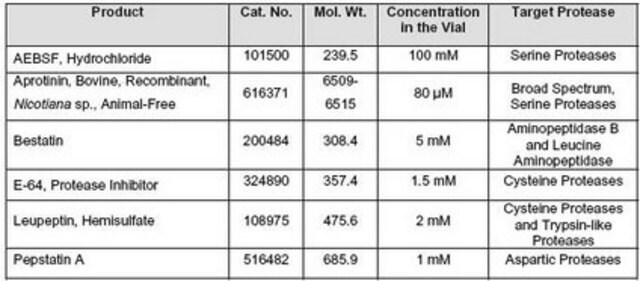I3911
Protease Inhibitor Cocktail
Animal-Free, lyophilized powder, for the inhibition of serine, cysteine, aspartic and metalloproteases, for general use, lyophilized powder
Synonyme(s) :
protease inhibitor
About This Item
Produits recommandés
Nom du produit
Protease Inhibitor Cocktail, Animal Component Free, for general use, lyophilized powder
Niveau de qualité
Forme
lyophilized powder
Solubilité
water: soluble
Température de stockage
−20°C
Vous recherchez des produits similaires ? Visite Guide de comparaison des produits
Description générale
Spécificité
Application
Composants
Aprotinin
Bestatin
E-64
EDTA
Leupeptin
Quantité
Not all extracts contain the same levels of endogenous enzymes, and it may be necessary to adjust the volume of cocktail required.
Forme physique
Mention d'avertissement
Danger
Mentions de danger
Classification des risques
Eye Dam. 1 - Skin Corr. 1A
Code de la classe de stockage
8A - Combustible corrosive hazardous materials
Classe de danger pour l'eau (WGK)
WGK 3
Point d'éclair (°F)
Not applicable
Point d'éclair (°C)
Not applicable
Faites votre choix parmi les versions les plus récentes :
Déjà en possession de ce produit ?
Retrouvez la documentation relative aux produits que vous avez récemment achetés dans la Bibliothèque de documents.
Les clients ont également consulté
Notre équipe de scientifiques dispose d'une expérience dans tous les secteurs de la recherche, notamment en sciences de la vie, science des matériaux, synthèse chimique, chromatographie, analyse et dans de nombreux autres domaines..
Contacter notre Service technique
















